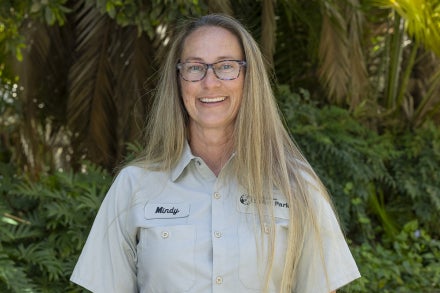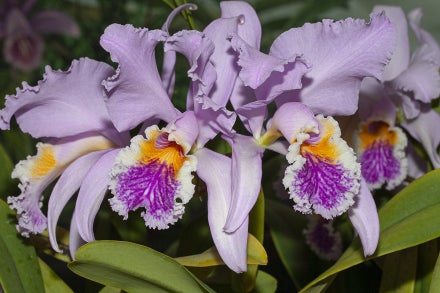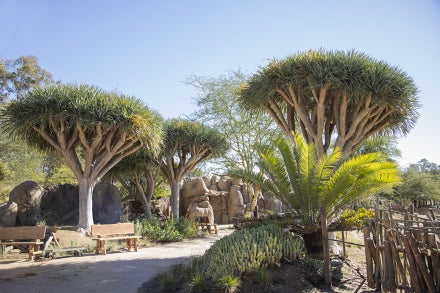FOR IMMEDIATE RELEASE
CONTACT:
San Diego Zoo Wildlife Alliance
Public Relations
619-685-3291
publicrelations@sdzwa.org
sdzwa.org
NEWS RELEASE
San Diego Zoo Wildlife Alliance Partners with Illumina’s iConserve to Create the World’s Largest Koala Pedigree Genomic Database
Study Will Aid in Worldwide Koala Conservation Efforts
SAN DIEGO (Jan. 9, 2024) – To apply cutting-edge technology to the conservation of koalas, San Diego Wildlife Alliance is partnering with Illumina, a leading genomic sequencing technology company, through the Illumina iConserve program to sequence the whole genomes (an individual’s complete set of DNA) of nearly 100 koalas residing in North America over the past 30 years. Whole genome sequencing is integral to learning more about Koala Retrovirus, KoRV – a virus that can insert into the koala genome and is associated with various health issues in koalas including immunosuppression and cancer.
Through contributions from San Diego Zoo Wildlife Alliance, Illumina, the University of Sydney, Australian Museum Research Institute, University of Nottingham, Leibniz Institute for Zoo and Wildlife Research, and ZooParc de Beauval, this study will create the largest koala pedigree genomic database in the world. The database will be shared globally to further guide koala conservation efforts, aid in the prevention of disease and help ensure the koala's long-term survival.
“Genomic sequencing of the North American koala population is a unique and impactful initiative,” said Cora Singleton, DVM, senior veterinarian, San Diego Zoo Wildlife Alliance. “As a wildlife veterinarian, I have seen the devastating effects of KoRV-related diseases such as leukemia and lymphoma. With Illumina’s help, it is incredibly rewarding to know we can achieve innovative conservation research that contributes to the growing body of knowledge about KoRV, and improves health and conservation outcomes for the species.”
Almost all koalas—in native habitats and in human care—are naturally infected with one or more retroviruses. In some koalas, these infections trigger disease. Scientists, biologists, ecologists and veterinarians worldwide are working together to advance the understanding of KoRV. San Diego Zoo Wildlife Alliance is providing Illumina with biological samples, some of which have been cryopreserved for decades in San Diego Zoo Wildlife Alliance’s Wildlife Biodiversity Bank.
”We are honored to partner with San Diego Zoo Wildlife Alliance and the esteemed organizations involved in this unique study that will serve koala conservation efforts well into the future,” said Ashley Van Zeeland, Ph.D., vice president of corporate development at Illumina. “This project embodies the mission of our iConserve program to accelerate environmental and wildlife conservation.”
Similar koala whole genome sequencing research focuses on koalas in their native habitats, but lacks information on koala ancestry and health outcomes. The San Diego Zoo Wildlife Alliance koala genomic project is unique in size, generational depth and health data available. This study will provide information on koala ancestry and medical information that previous studies lacked.
“While we have learned a lot about KoRV integrations and their impact on koala health from wild koalas, we still do not really know how KoRV is transmitted from one generation to the next, how new KoRV integrations are born, or which integrations are most important for koala health,” said Alex D. Greenwood, Ph.D., director of department of wildlife diseases, Leibniz Institute for Zoo and Wildlife Research.
“The koalas in this study form part of one of the most comprehensive pedigrees worldwide, with familial relationships reliably documented over decades of diligent species management and biobanking,” said David Alquezar, Ph.D., manager, Australian Centre for Wildlife Genomics, Australian Museum Research Institute. “Interrogating KoRV integration data across this ‘closed system’ of related individuals provides a unique opportunity to explore KoRV mobility and illuminate the effects these integrations may have on disease outcomes. This will be particularly relevant for koala populations [born in human care] that require cultivating a reservoir of robust and healthy individuals that may be used to support future translocations.”
The results of the study will be compared directly to, and integrated with, similar genomic sequencing analysis of the smaller European koala population and added to the more than 400 living koala genomes from the Koala Genome Project, an open data resource that was developed after the Australian megafires in 2017. The findings of these genomic studies have the potential to inform conservation management decisions that improve health outcomes of koalas in zoos and in their native habitats.
“Whether we can reduce the impact of KoRV-induced disease on koala populations through testing and breeding programs is a critical question for koala health and welfare,” said Rachael Tarlinton, Ph.D., associate professor in veterinary virology, faculty of medicine and health sciences, University of Nottingham.
“Understanding KoRV transmission and impacts on health will allow us to better evaluate the resilience of wild and zoo-based koala populations, and plan more effective and safe management actions to ensure the koala’s survival in the face of ongoing threats,” said Damien Higgins, Ph.D., associate professor in pathobiology and wildlife health, the University of Sydney.
The North American koala population was founded with 14 koalas from Australia, between 1976 and 1981. Over 40 years later, San Diego Zoo Wildlife Alliance cares for 30 koalas—the largest colony outside of Australia—and is the leader in koala care in North America. Decades of detailed husbandry, breeding, health recordkeeping and deliberate biological sample banking provide a unique and valuable research opportunity.
Koalas are one of Australia’s most iconic species. They are listed as Vulnerable on the International Union for Conservation of Nature (IUCN) Red List of Threatened Species. However, in 2022, koalas in Queensland, New South Wales and the Australian Capital Territory were listed as endangered by the Australian government. Koalas face threats in their native habitats that include bushfires, diseases, habitat loss and climate change.
###
About Illumina iConserve
iConserve is an Illumina initiative to accelerate environmental and wildlife conservation. The program aims to advance conservation goals by building partnerships, removing roadblocks to enable projects with acute conservation needs, and advocating for genomics as a conservation tool. The program’s work ultimately supports decisions made regarding species conservation and management. Past genomic conservation projects include bottlenose dolphins, red ruffed lemurs, western lowland gorillas and African elephants.
About San Diego Zoo Wildlife Alliance
San Diego Zoo Wildlife Alliance, a nonprofit conservation leader, inspires passion for nature and collaboration for a healthier world. The Alliance supports innovative conservation science through global partnerships. Through wildlife care, science expertise and collaboration, more than 44 endangered species have been reintroduced to native habitats. Annually, the Alliance reaches over 1 billion people, in person at the San Diego Zoo and San Diego Zoo Safari Park, and virtually in 150 countries through media channels, including San Diego Zoo Wildlife Explorers television programming in children’s hospitals in 13 countries. Wildlife Allies—members, donors and guests—make success possible.
About San Diego Zoo Wildlife Alliance San Diego Zoo Wildlife Alliance is a nonprofit international conservation leader, committed to inspiring a passion for nature and working toward a world where all life thrives. The Alliance empowers people from around the globe to support their mission to conserve wildlife through innovation and partnerships. San Diego Zoo Wildlife Alliance supports cutting-edge conservation and brings the stories of their work back to the San Diego Zoo and San Diego Zoo Safari Park—giving millions of guests, in person and virtually, the opportunity to experience conservation in action. The work of San Diego Zoo Wildlife Alliance extends from San Diego to eco-regional conservation “hubs” across the globe, where their expertise and assets—including the renowned Wildlife Biodiversity Bank—are able to effectively align with hundreds of regional partners to improve outcomes for wildlife in more coordinated efforts. By leveraging these skills in wildlife care and conservation science, and through collaboration with hundreds of partners, San Diego Zoo Wildlife Alliance has reintroduced more than 44 endangered species to native habitats. Each year, San Diego Zoo Wildlife Alliance’s work reaches over 1 billion people in 150 countries via news media, social media, their websites, educational resources and the San Diego Zoo Wildlife Explorers television programming, which is in children’s hospitals in 13 countries. Success is made possible by the support of members, donors and guests to the San Diego Zoo and San Diego Zoo Safari Park, who are Wildlife Allies committed to ensuring all life thrives.



